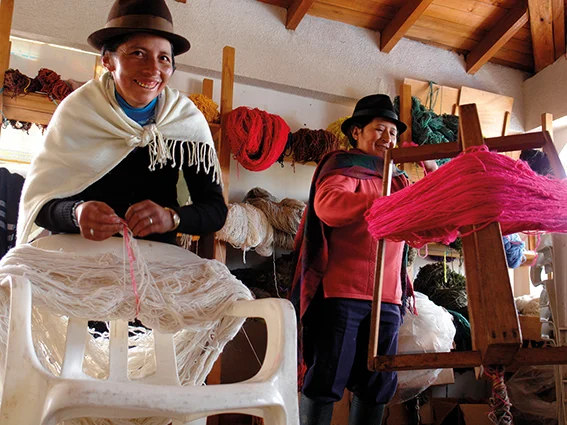
NGO Venture Forum | Hungary
In 1999, NESsT hosted the NGO Venture Forum and released Profits for Nonprofits, a publication focused on the need for social enterprise in Central Europe.

Fundația Cartea Călătoare | Romania
A foundation that advances its mission by producing and selling audiobooks for visually-impaired people

Kava | Hungary
A theater that supported its education programs by offering trainings to corporations and government agencies

Café and Tearoom Kacaba | Czech Republic
A social enterprise that employs people with intellectual disabilities

Texal | Ecuador
A social enterprise that hires low-income women to produce wool garments

Coanil | Chile
A foundation that operates a chocolate factory and employs people with intellectual disabilities

INCORES | Brazil
A social enterprise that trained and placed young people from low socioeconomic backgrounds in corporate jobs

Magrini | Peru
A company that produces agricultural machinery that helps small Andean farmers realize higher yields and greater income from their crops

Women working in Suritex’s plant have flexible working conditions that also allow them to care for their families.

Suritex provides training in wool processing, knitting and manufacturing, giving workers valuable professional skills in the textile industry.

Inka Moss hires people in the highland communities to work in its processing plant. Workers earn fair wages for processing and packaging the moss before it is shipped to Lima to be sold internationally.

A group of women venture out into the Andean highlands to collect moss. They have received training from Inka Moss on how to harvest the moss in a sustainable way to ensure it remains an ongoing natural resource for years to come.

Mari harvests moss to earn money for her family. Her only other source of income is from cultivating potatoes. During the winter, though, she’s not able to grow or sell potatoes. Now she gathers and sells moss to Inka Moss, and she has steady source of income all year round. Thanks to this new source of income, Mari has been able to pay for her son to go to university – ensuring the next generation will not live in poverty.

Retalhar contracts with sewing cooperatives like the Charlotte Arte Cooperativa de Constura in São Bernardo de Campo to produce gifts and blankets from the recycled uniforms.

Retalhar sources recycled textiles from Lutha Uniformes and other corporations, resulting in 10.5 tons of textile waste that the social enterprise has recycled to date.

Victor Clopotar is a coppersmith in the village of Brateiu. There used to be 200 Roma coppersmiths in his village. Now there are six left. He says he’s proud he can continue to practice the craft of his ancestors and make a living doing so.

Zoltan Bojody weaves wicker goods from his studio in Viişoara. He says his life has changed since joining the MBQ network. Zoltan is now able to sell his work to a broader customer base, which means he has a steady income to support his studio and practice his craft.

Lenuta Dumitru is a tailor from Bucharest. She has partnered with an MBQ fashion designer to infuse Roma prints and craftsmanship into modern clothing collections.

Radu Ion is a silversmith from Bucharest. For him, his artisanship is more than a trade. It’s an essential part of his Roma identity. His association with MBQ allows him to practice his Roma heritage and earn a dignified income from his work.

Tomasz is the chef’s assistant at Siedlisko. Tomasz never graduated from school and found himself without any skills or the ability to find a job. Siedlisko trained him as a cook and employed him in the center’s kitchen. He says he now feels excited to go to work in the morning and enjoys knowing that he is helping others through his work.

Justyna is an elderly care assistant at Siedlisko. She helps with bathing and dressing the residents, as well as taking them for walks and helping with other day-to-day activities.

More than 24 women in Tard have received income for their embroidery work. To date, these women have stitched 10,000 products for sale to matyodesign’s customers.

Erzsébet Gomány has lived in Tard her entire life. As a widow, she lives by herself on her government pension income. Erzsébet was one of the first embroiderers to work with matyodesign. It has taken her some time to get accustomed to stitching the Matyó rose in contemporary colors, but she appreciates sharing her craft and earning income from her work.

Móni Cserbák learned to embroider when she was 13 years old. Stitching has always helped her relax and retreat from daily stress, and now she’s also able to help support her family by earning income for her work.

Since the opening of the Ízlelő restaurant, 27 people have experienced life-changing employment. Proceeds from the restaurant have helped support services and social programs for 500 people served by the foundation.

To date, 45 people with disabilities have been trained for catering professions in the Ízlelő kitchen.


























